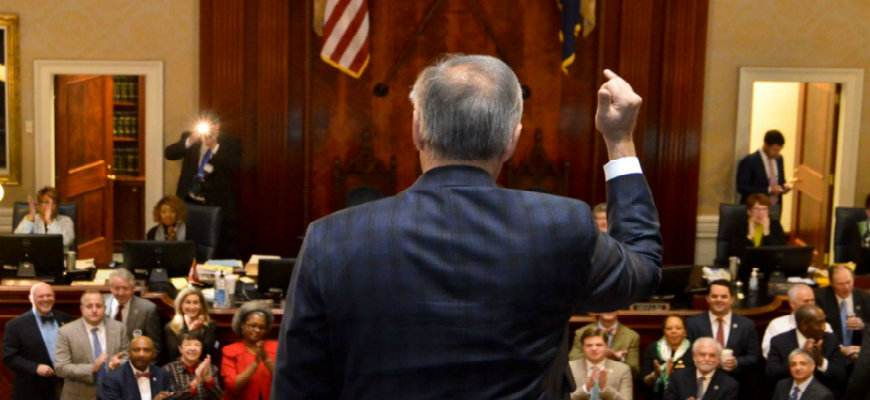
Here's a game-changer on state tuition
Posted on: December 10, 2018; Updated on: December 10, 2018
By Harris Pastides
There is bipartisan hope for a shared solution on the horizon.
Rising tuition is a challenge for South Carolina’s public colleges and universities and their students. As president of our state’s Council of Presidents, I’m committed, along with my colleagues, to doing everything possible to avoid raising tuition. Yet, the hard truth is that we need renewed public support, which has been cut by nearly 40 percent since 2008, the fourth largest cut to higher education in the nation. In fact, we are the only major sector in the state budget that remains below pre-Great Recession funding levels.
But there is bipartisan hope for a shared solution on the horizon. At the request of Sen. Harvey Peeler and Sen. Vincent Sheheen, Senate President Pro Tempore Hugh Leatherman recently appointed a special South Carolina Senate committee to hold hearings on a piece of legislation that portends to be a game-changer.
The culmination of bipartisan discussions among Senate leaders, the Higher Education Opportunity Act (HEOA) was introduced in May by Sen. Sheheen and Sen. Nikki Setzler, with the encouragement of Sen. Peeler, renewing the partnership between public colleges and universities and the state.
The bill would establish something that has never before existed in our state: a dedicated and permanent source of funding for higher education.
In June, a U.S. Supreme Court ruling paved the way for states to realize new revenue from previously uncollectable internet sales, which for South Carolina, could translate to tens of millions of dollars annually. These internet sales, where the tax is paid by out-of-state businesses and not our local Main Street retailers, would, under the HEOA, smartly be used for the benefit of in-state college students.
Most importantly, the HEOA guarantees that this new funding would be distributed based on in-state enrollment, incentivizing our institutions to recruit and retain South Carolinians — all without raising taxes.
In return, institutions would agree to freeze in-state tuition for at least one year and then cap future increases at a rate that can never exceed inflation, making college more affordable for more in-state students and decreasing out-of-state reliance. After all, the best way to increase the number of in-state students is to FUND in-state students.
The bill would establish something that has never before existed in our state: a dedicated and permanent source of funding for higher education.
In fact, had the HEOA been in place over the past decade, even the most conservative
calculations indicate that tuition growth would have been more than 30 percent slower.
The HEOA can’t erase the past, but what it will do is capture these substantial savings
— and more — for our students today and in the future.
The bill also serves three other critical areas:
First, it would modernize the state’s scholarship offerings by ensuring the sustainability of current merit-based scholarship programs, while focusing more state resources on assisting students with financial need.
Second, similar to provisions within the Higher Education Efficiency Act passed by the House of Representatives last year and introduced in the Senate by Sen. Scott Talley, it would also reduce duplicative bureaucratic regulation, which would markedly help reduce costs driven up by layers of red tape.
Lastly, it would establish funding dedicated entirely to repairing our public colleges’ aging and crumbling campus facilities, infrastructure and equipment.
In sum, there is no doubt that the bipartisan HEOA is rooted in fairness and shared commitment, and represents the most significant step forward in higher education policy in more than a decade. Our state’s public colleges and universities don’t expect to be treated special — we simply ask to be treated fairly. When this happens, our state’s students are the real winners.
Ultimately, it is our hope that the Higher Education Opportunity Act is placed front and center during this legislative session, draws wide support and is passed into law. I applaud Sens. Sheheen and Peeler and the broader General Assembly for their leadership and willingness to work with us to construct a pathway toward meeting the state’s long-term commitment to South Carolina students and families.
As former senator and newly appointed chairman of the state’s Commission on Higher Education Wes Hayes recently stated, “We have an outstanding higher education system in South Carolina that is vital to our economic development and to our quality of life.” Indeed, education is a better head start to a successful life than anything else America has ever come up with.
The HEOA provides our students the head start to achieve the future of their dreams. That’s why I am more hopeful than I have been in a long time that the path to even greater access, affordability and quality is within reach.
We can do no less for our public colleges and universities — and we can do no less for the students of South Carolina.
As published in The Spartanburg Herald-Journal on December 9, 2018.